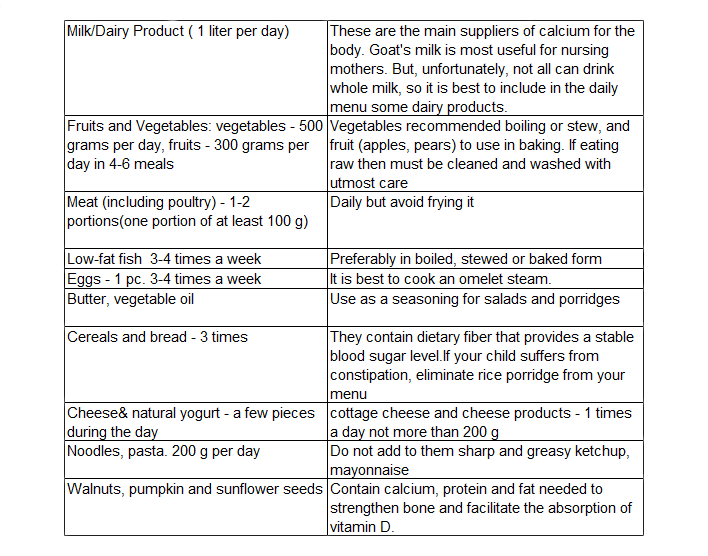Nutrition during breast feeding

I have 2 daughters. Both of them grew up with the breast milk. I have read a lot about nutrition during breastfeeding. Some useful suggestions were totally opposite from a rigid diet to eat what you want and how you want. And each version has his followers.
What was my experience? Really different with each child! After the birth of my first daughter, doctor advised to follow strict diet. I did but my daughter had rash on the skin, I made my diet stricter but she still had a rash on her face. I was very nervous and I was always hungry, every spare moment i ran to the kitchen looking for some food to eat, I ate only several kinds of food but she still had this rush. I was getting very stressed and weak. I was so despair that started to eat only buckwheat, but it didn’t help
at all. Situation at home was very tense…. Something was needed to happen. And it did! Thank God, at that time my husband signed a contract with Tunisian company and we went to a beautiful island in the Mediterranean Sea. And I started to eat!!!!Simple, natural, with good mood and peace in my mind, i began to eat, and it was like miracle! This troublesome face rush disappeared!!! Everything was on its place from that time!
Coming up and having the strength and mental harmony I started to analyze what had happened.
Today after all of this I can make some conclusions:
- Yes, you need a diet, but it should be a healthy diet with a full range of products, and I think no one doubted that alcohol, chips and other stuff is not good to a nursing mother and not good to anyone! It’s not even a question.
- While the baby is still a little it is better to eat different kinds of food separately, often increased flatulence starts after the mother eat a lot of different kinds of food at the same time. Some products need different pH and different enzymes and they just cannot be digested in the stomach together and start to rot in the guts.
- On the third week of life the baby has a rash on the face, red pimples with white head; it has nothing to do with the mother’s diet but the hormonal changes of the body. It passes with time itself.
- Mom’s emotions are very important! Milk is not only a set of vitamins and nutrients. It carries certain energy, certain information. All of mom’s emotions, fears and experiences, joys and hopes get imprinted in her milk. Baby can feel pain in the stomach and anxiety, even only for this reason.
- Quality of food is important! I often compare the food with bricks, and our body with the house that we are building. If you build a house from the defective bricks it will not be strong and reliable!
Now let’s talk specifically about nutrition. To benefit breast milk we need to take care of our daily diet. It should be varied and balanced. The diet should be built on products which contain sufficient vitamins, minerals and microelements.
- First month after baby delivery everything will be new to the mother, it is very important to establish contact with the child, to set up breastfeeding and recover after giving birth. And of course we need to check if the food is balanced and has a required amount of calories. Therefore, it is recommended to comply with diet, which includes three main meals and two snacks. According to conventional practice, we should eat half an hour before breastfeeding. If we talk about the number of calories: in lactation period, milk production consumes more energy than usual. That’s why the average caloric value for the nursing mother should be at least 3 thousand calories a day. It is better to prepare food in a way that can save the greatest number of useful nutrients – by roasting, boiling, steaming. Its better avoid fried food.
- Nutrition of lactating mother in the first months must exclude potentially harmful products and substances that may penetrate into the milk. These include all kinds of alcohol, nicotine, drugs and some medications.
Also during breast-feeding a baby, especially in the first month, it is strongly recommended to exclude food allergens. Potential allergens can be citrus, honey, chocolate and coffee. When the baby grows up a little bit you can gently try these products, but it’s better to try them one by one by one and look at the reaction. - Our diet should have enough quantity of carbohydrates, like cereals: buckwheat, oat, rice porridge, whole meal bread. Other sources of carbohydrates, fiber and vitamins are vegetables and fruits. Fiber is essential for the normal function of the intestine; the vitamins will be useful for the mother and for the baby. Keep in mind that the best fruits and vegetables are digested when eaten on an empty stomach. Therefore it is useful eating them as a snack.
- Meat is a major source of protein and should be included in the initial months of breastfeeding. It is important to choose the “right” meat – low-fat varieties of it, for example, poultry, veal. Fish will also be useful. By the way, the fish, butter and eggs are suppliers of vitamin D which is needed for the formation of baby’s bones. The diet of lactating mothers must include these products as well.
- Milk should be no more than 1.5% fat and is better to use it boiled. Dairy products should be “live”, without adding any dyes and flavorings, the most suitable for nursing mother will be natural yogurt.
- Sugar should be consumed, but in small quantity. Excessive amounts of sugar can cause fermentation in the gut and flatulence. And that is that baby does not need.
- Concerning salts it is better not exceed 5 g norm (half teaspoon) per day.
- We also should not put in a meal excessive amount of herbs and spices – they can affect the taste of milk and cause unwanted baby reactions. My baby was at the age of 1 year and 4 month when I tried spicy Chinese food and after that the skin under her diaper blushed.
- In the early days of breastfeeding foods that cause flatulence should be excluded. These include beans, pearl barley, yeast pastries, melons, and sweet. There must not be any preservatives: all kinds of chips, fruit yogurt is better to postponed for later. Always remember that your meal is baby’s meal!
Taking into account all of this lets try to make an example of menu for lactating mothers!
It’s just a sample, in order not to forget to use all groups of products. But honestly speaking nobody knows your organism better than you. The safest menu is one which consists of your genetically familiar foods. If you’re not sure think if your grandmother ate this of not? I mean, that it’s better to eat seasonal vegetables and fruits which were grown in your homelands geographical area.
And please don’t forget the most important: breast milk is alive; it carries all your feelings, all your thoughts and all your love to your little baby. Be happy and feed your baby with happiness, love and sense of security!
- Valeriia kryvosheieva
- March 7, 2016
- 0 Comment







